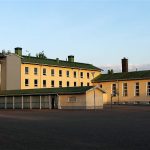
President Sauli Niinistö. Picture: Tony Öhberg for Finland Today
President Sauli Niinistö opened the parliament at the Finlandia Hall on Thursday afternoon by reminding the fellow politicians that during the past 100 years, Finland would not have survived without the stalwart presidents of the early years.
According to Niinistö, a great tradition in domestic policy was born in the footsteps of K.J. Ståhlberg, Väinö Tanner (prime minister and foreign minister) and P.E. Svinhufvud. “In addition, Lex Kallio (the law that enabled one to purchase land for farming) a law whose very name is a kind of metaphor for being anchored in Finnish granite, formed the bedrock of all of this,” Niinistö said. “A great tradition in domestic policy was born: that differing views, including deep contradictions, can be solved by democratic means, even if this ultimately involves chastising your own side.”
Without this “we would not have survived the wars and dangerous years that followed.” “In other words, we would not have survived without Finns feeling that ‘we are all a part of this, this is our common goal – the arguments can be had and solved later, when we can thrash out our differences properly.'”
A tradition of foreign policy was established, aimed towards the West, “but necessarily sought to secure our existence alongside our neighbor, the Soviet Union, which later dissolved.” The door opened to Europe, whose goals and values “we felt very much at home,” Niinistö said.
Since then, the world has changed with technology, the digital world and robots taking us into entirely new realms. “But there has been no change in basic human mentality; there are negative and positive feelings both within and between nations. So, the same issues always arise,” said the president.
Niinistö reminded the listeners that “the financial crisis brought us back to earth, but did not fully awaken us.” “During many of the following lean years, we comforted ourselves with the idea that ‘growth will resume next year’ or we ‘will respond with a stimulus,’ or that change would arrive ‘during the next term of government at the latest.’ Living on credit began to be the new normal.”
According to Niinistö, despite all this, “we cannot afford to do nothing.” “I would encourage you to forge ahead.” “The key issue is that we continue our great tradition in domestic policy, of cherishing democracy. We have no major movements within or outside politics that would seek to challenge our democratic system,” Niinistö said.
Niinistö continued with some solid advice to the fellow politicians: “We, the representatives of the people, need to remain cool-headed and – at times – be patient and remember the big picture. We need to show that we appreciate what we do, but that we also respect the efforts of those who disagree with us. This will send out a signal of stability to our fellow Finns.”
Niinistö warned against the dangers of the rising protectionism (restricted trade between countries). “If trade restrictions are imposed, they are bound to lead to retaliation,” he said. “The closure of economic or other borders is not a cure for the imbalances of globalization. No nation can flourish by forgetting the rest. The direction should be towards open cooperation based on international rules.”
[alert type=white ]”The closure of economic or other borders is not a cure for the imbalances of globalization. No nation can flourish by forgetting the rest. The direction should be towards open cooperation based on international rules.”[/alert]
According to Niinistö, in addition to the good it has done, globalization has increased inequality. “I consider it important for Finland to combat inequality. I am sure that you would like to engage in broad cooperation in this respect. In addition to public sector activities, each and every Finn has the duty to help those who are in need; to encourage those who need encouragement; but also to prod those who choose to be inactive. And we must all give a clear message to greed: No!” “Our existence is based on the values of democracy, human rights and equality. These are also the foundations of our foreign policy,” Niinistö continued. According to Niinistö, Finland’s security policy can have only one objective: “how best to ensure a secure life for Finnish people.”
In the end of his speech, Niinistö referred to the four pillars of the Finnish security policy, which he has advocated previously. According to Niinistö, the pillars are not static, but develop over time. Here’s the update:
The four pillars in 2017
1. First of all, with regard to national measures, the parliament will soon receive a Government Report on Finnish Defence Policy for its consideration. It has a clear message: Evil will be met with stiff resistance if it comes here. In addition to which, Finland will be a strong partner if a crisis occurs.
2. Secondly, I would like to refer to partnerships. Even we are surprised by how well cooperation with Sweden has progressed. Where applicable, the same cooperation could occur alongside the other Nordic countries. The EU has also woken up to the need of protecting itself, something which we in Finland have long advocated. We have been at the heart of a NATO Summit for the first time, which sends a strong signal. We are building on a long-standing relationship with the United States, which has yielded results in areas including arms sales and beyond.
3. Thirdly, there is our relationship with Russia, which has always been an inevitable and essential priority for us. We have no bilateral problems in this regard and have no interest in creating such problems. They respond to our invitations as do we to theirs, talking very frankly, as good neighbors tend to do. We know each other very well.
4. The fourth pillar is the rules-based international order resting on the United Nations. This is our weakest pillar and we draw no comfort from the fact that the same holds true globally. There are now major problems in this regard – will a few big fishes cruise past the hundreds of minnows? We are on the side of the little fish, but not against the big ones. An effective and just international order is ultimately in everyone's interests.










